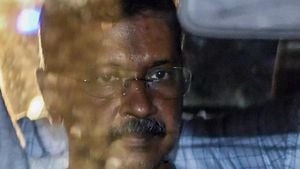With Donald Trump once again taking the reins as President, many Americans are raising eyebrows and holding their breath as they await the ripple effects of his administration’s appointments and policy intentions. Unfolding gradually, his picks include notable figures for the health sector, civil service, and education, each of whom aims to implement his vision for America. The immediate reactions highlight widespread uncertainty—from concerns about education policies affecting immigrants to potential changes impacting retirees' financial security.
One of the more consequential announcements came as Trump named Dr. Janette Nesheiwat as the new U.S. Surgeon General. With concerns surrounding public health still prevalent, her background as both a medical doctor and Fox News contributor raises questions among public health experts. Meanwhile, Trump's other health nominees, including Dr. Marty Makary for FDA commissioner and Dr. Dave Weldon for the CDC director, follow closely behind, signaling how Trump intends to reshape America's health policies amid rising skepticism about vaccine safety and efficacy.
Another pivotal aspect of Trump’s upcoming administration lies within higher education. During discussions about the potential ramifications of Trump’s presidency on universities, Nevada State University President Dr. DeRionne Pollard expressed deep concern for her students, many of whom are undocumented immigrants. Pollard was quick to indicate how Trump’s administration could escalate fears among these students, highlighting the precarious environment they find themselves in.
Pollard voiced her commitment to supporting her students by working with faculty to develop strategies addressing Trump’s deportation agenda, which could affect about 11 million undocumented residents. "I now spend an inordinate amount of my time thinking about how to protect and insulate this institution as much as I can, considering the students we serve," she said. A significant 3% of college students in Nevada are undocumented, leading colleges to prepare to safeguard these vulnerable individuals.
With reports of possible cuts to funding for arts and culture programs surfacing, other university leaders joined Pollard at the roundtable, including UNLV President Keith Whitfield. Whitfield emphasized the importance of continuing support for the arts as part of students’ educational experience, but also admitted the uncertainty surrounding Trump’s plans brings anxiety. He stated, "It’s the unknown they’re worried about," reflecting broader concerns about the direction Trump may take with federal funding and educational policies.
While the education sector anticipates changes, retirees are also bracing for the repercussions of Trump’s economic policies. Early promises indicate Trump may push to extend the 2017 Tax Cuts and Jobs Act, which could keep some taxes low for retirees. “Fewer taxes mean more money in your pocket,” commented Chris Mediate, president of Mediate Financial Services, who underscored how tax relief could positively impact retirement savings.
Still, experts are cautious. “The trends and forces of the economy are far more powerful than presidential policies,” said investment strategist Ross Mayfield. His sentiment resonates across many financial conversations, as retirees weigh their options and try to navigate potential policy shifts without clear guidance on what’s to come.
Social Security benefits are also on the chopping block as Trump vows not to cut any funds—or at least so he promises now. He has indicated intentions to end taxes on Social Security benefits altogether, which, if implemented, could relieve many retirees’ financial burdens. Yet, analysts are cautious, with doubts about the sustainability of Social Security funding arising after 2033—making it more pressing than ever for beneficiaries to look closely at their financial plans.
Accenting these appointments is Trump’s controversial decision to appoint Robert F. Kennedy Jr. at the helm of the Department of Health and Human Services. A vocal anti-vaccine advocate, Kennedy’s influence on public health policy raises alarms on both sides of the aisle. Although some commend his willingness to shake up the establishment, others worry his stance may lead to public health crises amid stubborn misinformation surrounding vaccines and infectious diseases.
Meanwhile, academic leaders are not just worried about how policies affect students’ educational trajectories but also about the broader societal shifts fueled by Trump's presidency. The recent anti-scientific sentiment, exemplified through various policy discussions, means leaders like Kumud Acharya from the Desert Research Institute have their hands full addressing rising animosity toward experts and scientific endeavors. Acharya stressed the need to convey the personal impact of scientific research to the public: "Scientists need to speak to the personal effects of what they’re studying,” he asserted.
At the same time, leaders from the education sector acknowledge the need to maintain consistent values during these turbulent times. William Kibler from the College of Southern Nevada underscored the importance of remaining steadfast amid changes, saying, "We need to concentrate on how we treat and support each other, especially when facing uncertainty.” This shared sentiment is likely contributing to the mounting anxiety seen among educators and students alike.
Overall, the direction of Trump's administration could lead to sweeping alterations—both intended and unintended—that impact numerous aspects of American life, including health, education, and retirement. With appointments and policies rolling out, many will need to adapt quickly or risk falling through the cracks. Be it retirees reevaluated strategies amid shifting economic plans or college students preparing to face potential deportation fears, there's no doubt this administration will bring forth significant changes requiring substantial adjustments and vigilance from every sector of American society.



